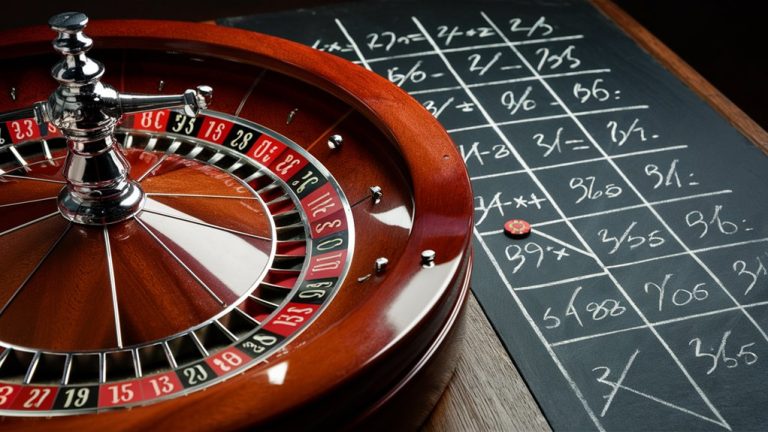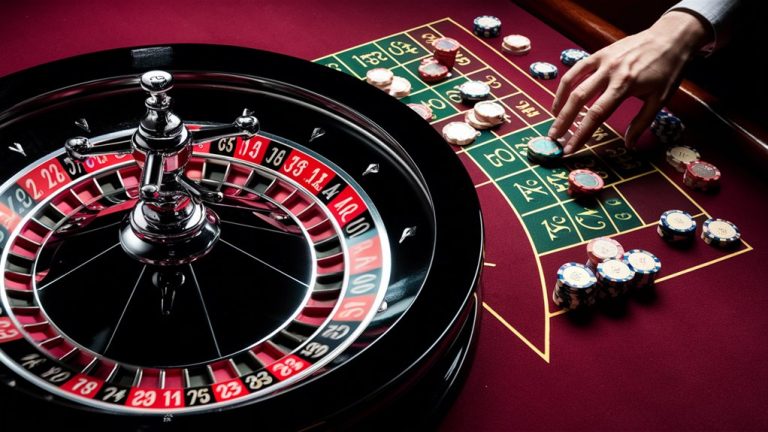Basics of Poker Psychology: Master Your Mind Game

Key Mind Elements to Win at Poker
Strong mind and smart plans are essential for top poker pros. Winning at poker involves maintaining a cool head, identifying body hints, recognizing bet trends, and staying composed under stress.
Main Mind Skills Needed for Poker Wins
Keep Emotions in Check and Manage Money
Smart money control is crucial for pros. By implementing good choice plans and building mental toughness, players prevent tilt and poor decisions.
Study Rivals and Notice Patterns
Being skilled at observing opponents requires practice in analyzing their actions. Key signs include:
- Betting patterns
- Indicators of strength or weakness
- Timing clues in both live and online games
Boost Your Best Play
Top mind tools enhance your poker game through:
- Proper breathing to manage stress
- Clear self-talk during decision-making
- Playing from advantageous positions
- Mental preparation
Know Your Rival
Study Your Rival in Poker: A Full Guide
Learn Bodily Hints and Behavior Patterns
Knowing your rival is crucial for winning at poker.
Player study involves observing body hints, bet styles, and timing shifts to make informed decisions.
Look at Body Signs
Bodily hints provide valuable insights into hand strength and player confidence. Important signs include:
- Pupil dilation
- Neck pulses
- Trembling hands
- Body stress responses
Watch Bet Styles
Clever bet analysis reveals consistent patterns in a player’s behavior:
- Betting based on position
- Continuation betting frequency
- Aggressiveness level
- Risk appetite regarding bet sizes
Understand Timing Hints
Observing decision timing helps anticipate strategies:
- Quick actions often indicate pre-determined plays
- Delays may suggest genuine contemplation
- Rhythm disruptions could indicate hand strength
- Variation in betting speed reflects player confidence
Handle Tilt and Emotions
Manage Poker Tilt and Keep Emotions in Check
Understand Tilt in Poker
Controlling emotions and managing money are essential for poker success.
Tilt can be detrimental, leading to poor decisions that overshadow skillful play.
Create an Emotion Plan
Set Firm Stop-Loss Rules
Establish clear stop-loss rules before starting a game.
Exiting once predefined loss limits are reached protects against significant financial losses during tilt.
Use Mindfulness
- Deep breathing between hands
- Monitoring jaw tension
- Acknowledging shoulder and neck tension
- Taking mental breaks for clarity
- 이 자료 참고하기
Deal With Common Tilt Pushes
Manage Bad Beats
Focus on correct decision-making processes rather than immediate outcomes.
Assess plays for their long-term value rather than short-term results.
Deal With Bold Rivals
Convert emotional challenges into analytical opportunities by:
- Assessing opponent betting behavior
- Analyzing frequent actions
- Turning bold rival moves into strategic opportunities
- Basing decisions on objective analysis
Track How You Do
Maintain a poker journal with notes on:
- Emotional experiences during games
- The impact of emotions on decision-making
- Triggers of tilt
- Effectiveness of tilt management
- Emotional patterns
Common Poker Hints
Common Poker Hints: A Full Guide
Learn Body and Behavior Hints in Live Poker
Body and behavior hints offer live poker players a competitive edge beyond bet trends.
The most informative hints arise from unintended actions during high-stress moments. How to Identify and Avoid
Classic Poker Hints to Watch
Be attentive to certain tells:
- Players staring at chips with strong hands
- Feigning disinterest while deeply engaged
- Freezing upon seeing cards
- Timing clues through slow or fast actions
Study Player Moves
Changes in typical behaviors provide insights. Observe:
- Talkative players becoming silent
- Shifts in chip-stacking habits
- Altered betting behavior
- Changes in posture or breathing
Top Tip Spotting
Effective tell reading relies on recognizing multiple consistent signals. Focus on:
- Grouped behavior changes
- Stress-induced bodily cues
- Unanticipated shifts in betting tempo
- Integration of timing and physical hints
Build Toughness in Mind
Grow a Strong Mind in Poker

Learn Top Parts of Mental Strength
Mental resilience in poker forms the foundational difference between top players and others. Achieve success by mastering these essentials: emotion regulation, tilt management, and acceptance of loss.
How to Keep Emotions in Line
Applying structured breathing techniques in high-pressure situations establishes a stable foundation for sound decision-making.
Top Ways to Stop Tilt
Effective tilt prevention adheres to robust mental anchors.
Using physical cues like card guards aids in resetting focus after challenging hands.
Learn to Take Losses
Training for loss acceptance fosters long-term success. View each hand as a data source, detached from emotion.
Rely on strict financial guidelines and thorough record-keeping.
Make Choices Under Stress
Be Best at Deciding Under Stress
Key Parts of High-Stress Choices
In high-stress scenarios, making wise decisions hinges on three cognitive strategies: information selection, odds assessment, and emotion regulation.
Smart Info Handling
Effective information filtering is essential under stress.
Professionals rapidly identify critical details like opponent tendencies and odds calculations.
Top-level Odds Guessing
Accurate probability assessment is crucial in high-pressure moments.
Players who maintain precise calculations under stress often outperform intuitive decision-makers.
Handling Stress and Thinking Well
Stress management is vital for cognitive clarity. High stress hormone levels can impair cognitive function.
Techniques such as controlled breathing and positive self-talk preserve cognitive sharpness.
Make Your Best Choices Under Stress
For excellence, practice consistently and apply these strategies. Elite decision-makers use a seamless process to make fast and accurate choices under pressure.
Poker Table Image and Mind Tricks
Know Poker Table Image and Mind Play
Learn Basics of Table Image
Table image is a psychological tool influencing game dynamics and opponents’ decisions.
Mastery involves the perceived play style and strategic manipulation of this perception.
The Four Main Table Images
Understanding and utilizing table image categories is essential:
- Tight-Aggressive (TAG)
- Loose-Aggressive (LAG)
- Tight-Passive
- Loose-Passive
Smart Image Play
Effective image manipulation revolves around three core aspects:
- Bet sizing and frequency
- Action timing and rhythm
- Self-presentation and demeanor
Money Mind in Poker
The Whole Guide to Poker Money Mind
Know the Mind Game of Money Handling
Professional poker players face unique psychological challenges in money management.
Set Money Apart
Segregating funds is a fundamental rule for maintaining emotional balance.
Risk Handling and Keeping Cool
Block Tilt and Win Back Losses
The brain’s reward system can prompt risky decisions during adversity.
- Cash Games: 20-30 buy-ins recommended
- Tournament Play: 100+ buy-ins suggested
- Stakes Selection: Clear criteria for moving up or down
Facts-First Choices
Tracking financial performance and psychological states provides insights for effective money management.






